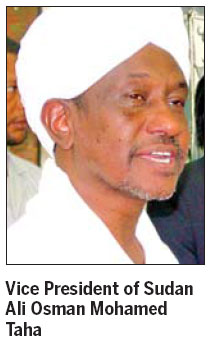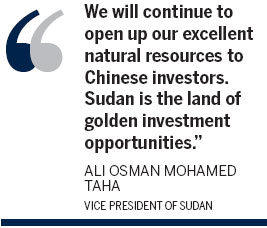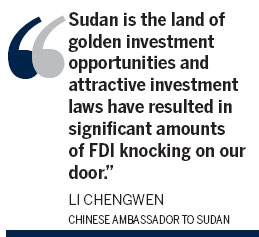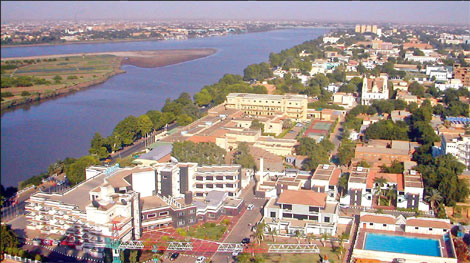News
Cooperation lays foundations for Sudan's economy
(China Daily)
Updated: 2010-10-29 08:08
 |
Large Medium Small |
|
Situated on the banks of the River Nile, the Sudanese capital of Khartoum is a bustling, modern metropolis. Provided to China Daily |
Foreign finance, technology and trade drive country's solid development
Africa's largest country in size, the Republic of the Sudan is blessed with a vast portfolio of natural resources that offer Chinese investors huge potential in the oil, mining, energy and agricultural sectors, along with infrastructure development.
Bordered by nine countries and with a coastline on one of the world's busiest shipping lanes, Sudan is making solid socioeconomic progress funded by massive revenues from the 600,000 barrels of oil pumped from its wells on a daily basis.
The ambitious country of 2.5 million square kilometers is endowed with the magnificent River Nile and emerged unscathed from the global financial crisis as 2009 GDP rose 3.8 percent in real terms. This robust growth was fueled by strong exports of oil and commodities, such as cotton, sugar, groundnuts and sesame.
Nationwide democratic elections were held in April 2010, and a referendum on whether the region of Southern Sudan should retain its semi-autonomous status, will be held in January 2011.

This political stability, generated by the federal government and 26 state governments is supported by an independent judicial system.
The Government of National Unity, which was formed under the 2005 Comprehensive Peace Agreement, is headed by President Omer Hassan Ahmed Al-Bashir.
His administration focuses on enticing foreign direct investment (FDI) from major countries such as China. Over the past two years, President Al-Bashir has held several meetings with Chinese President Hu Jintao and the Vice President Xi Jinping.
Sudan is a signatory of many regional and international trade agreements aimed at promoting FDI and trade with countries in Africa, the Middle East, and beyond.
The country is eyeing membership of the World Trade Organization and is already part of the Common Market for Eastern and Southern Africa (COMESA) trade bloc and the Greater Arab Free Trade Association (GAFTA).
With a liberalized economy that is slowly embracing privatization as it proceeds along the path to modernization, Sudan's investment laws offer a range of benefits and advantages, such as tax breaks, freedom of capital transfer, customs exemptions and simplified registry procedures.
As in previous decades, China is playing a leading role in Sudan's socioeconomic development. Last year marked the 50th anniversary of diplomatic relations between the two countries.
China recently offered support to the construction of new roads, bridges, power networks, health and education facilities and programs, plus a broad range of irrigation and agricultural projects in Sudan.
Ali Osman Mohamed Taha, vice president of Sudan, noted:"Our deeply rooted bilateral relations and mutual respect provide solid foundations for future economic success as we develop further positive partnerships with China across our sectors and industries."
To illustrate just how important Chinese involvement is in his country's economy and development, the vice president said: "Sudan is now China's third largest trade partner in Africa (behind South Africa and Angola) and we are continuing to build on 51 years of exemplary bilateral relations. China has made a great contribution to our country's development in many different fields and walks of life."
Golden opportunities

The vice president emphasized the importance of Sudan's national strategic plan which details how Sudan will reap the rewards of its natural resources and grow and develop with the help of international partners like China.
"Sudan is the land of golden investment opportunities and attractive investment laws have resulted in significant amounts of FDI knocking on our door."
According to the Chinese Ambassador to Sudan, Li Chengwen, these flourishing Sino-Sudanese relations are built on the three core ingredients of "mutual respect, common work and interest and a stable and long-term friendship".
In recent years, Chinese companies have been awarded contracts for many key infrastructure projects. They include several new roads, giant hydro-electric plants and energy and power transmission facilities.
"Together, these projects have formed a very important base for big economic growth in Sudan," said Li. "China is providing strong support in the irrigation, industrial and agricultural sectors that changes lives.
"We constantly push the principle - over all others - that whatever the system for government or the commercial or investment relationship, it must be mutual and benefit both parties and people."
Effective education co-op

Ambassador Li illustrated this point by highlighting increased Sino-Sudanese cooperation in the area of education with China expanding the number of scholarships offered to Sudanese students.
He revealed China's plans to open a cultural center in the capital, Khartoum, and that a Chinese firm wants to open Sudan's first fertilizer factory in a move that would boost the agricultural industry.
Looking ahead, Li added: "Sudan is a huge country but there are many things that need to be done. We would like to stress our cooperation in various fields and we will continue to support Sudan's sovereignty, economic growth, peaceful development and stability."
With a tropical climate and diverse terrain that includes savannah and forest, Sudan faces many environmental issues and is at the forefront of Africa's efforts to fight climate change and the devastating consequences of desertification.
As well as contributing to poverty and migration through damage to the agricultural belt where many of Sudan's cash crops and export-bound commodities are grown and harvested, changing weather patterns are stifling the country's economic growth.
Due to global warming and deforestation, the Sahara Desert is creeping further south, harming wildlife and causing water shortages.
This vital battle against climate change is being led by the Ministry of Environment and Physical Development in conjunction with forward-thinking government bodies like the National Survey Authority, the Higher Council for Environment and Natural Resources and the National Council for Physical Development.
The ministry designs and funds many of the environmental projects and programs taking place across the country and is one of the organizers of the Nile Basin Initiative that aims to preserve the future of Africa's most famous river in the face of climate change and global warming.
"Located 350 km north of Khartoum, the $2 billion Merowe Dam Project is a massive hydroelectric power generation facility on the Nile. Chinese construction firms were heavily involved in the project as well as many other infrastructure programs located close to the river," said Bakri Mulah, secretary general of the External Information Secretariat.
China Daily
(China Daily 10/29/2010 page17)
